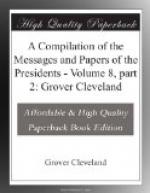He also recommends that the rates of postage on printed matter be so revised as to render them more simple and more uniform in their operation upon all classes of printed matter. I submit the recommendations of the report to your favorable consideration.
The public statutes of the United States have now been accumulating for more than sixty years, and, interspersed with private acts, are scattered through numerous volumes, and, from the cost of the whole, have become almost inaccessible to the great mass of the community. They also exhibit much of the incongruity and imperfection of hasty legislation. As it seems to be generally conceded that there is no “common law” of the United States to supply the defects of their legislation, it is most important that that legislation should be as perfect as possible, defining every power intended to be conferred, every crime intended to be made punishable, and prescribing the punishment to be inflicted. In addition to some particular cases spoken of more at length, the whole criminal code is now lamentably defective. Some offenses are imperfectly described and others are entirely omitted, so that flagrant crimes may be committed with impunity. The scale of punishment is not in all cases graduated according to the degree and nature of the offense, and is often rendered more unequal by the different modes of imprisonment or penitentiary confinement in the different States.
Many laws of a permanent character have been introduced into appropriation bills, and it is often difficult to determine whether the particular clause expires with the temporary act of which it is a part or continues in force. It has also frequently happened that enactments and provisions of law have been introduced into bills with the title or general subject of which they have little or no connection or relation. In this mode of legislation so many enactments have been heaped upon each other, and often with but little consideration, that in many instances it is difficult to search out and determine what is the law.
The Government of the United States is emphatically a government of written laws. The statutes should therefore, as far as practicable, not only be made accessible to all, but be expressed in language so plain and simple as to be understood by all and arranged in such method as to give perspicuity to every subject. Many of the States have revised their public acts with great and manifest benefit, and I recommend that provision be made by law for the appointment of a commission to revise the public statutes of the United States, arranging them in order, supplying deficiencies, correcting incongruities, simplifying their language, and reporting them to Congress for its action.
An act of Congress approved 30th September, 1850, contained a provision for the extension of the Capitol according to such plan as might be approved by the President, and appropriated $100,000 to be expended under his direction by such architect as he should appoint to execute the same. On examining the various plans which had been submitted by different architects in pursuance of an advertisement by a committee of the Senate no one was found to be entirely satisfactory, and it was therefore deemed advisable to combine and adopt the advantages of several.




